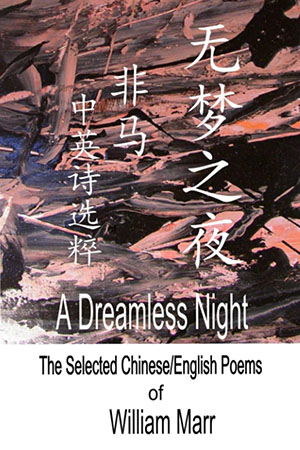|

A Dreamless Night
The Selected Chinese/English Poems of William Marr
168 Poems ~ Reviews and Comments ~ 258 Pages
Format: 6’’ x 9’’ ~ Perfect Bound
Publisher: Chicago Academic Press
Price: $21.99
ISBN: 9798761154803
To Order: Amazon.com
Reviewed by Michael Escoubas
Of the great Chinese poets of history, Du Fu, (712-770, Tang dynasty), arguably was the greatest. Although this description may apply to many, I use the reference here simply to highlight that William Marr, like Du Fu, seeks to build bridges. Du Fu made poems out of the cloth of everyday experiences, bridging the commonplace with the profound. This is what good poets do.
William Marr doesn’t look for subjects about which to write. The subjects find the poet. Witness his latest collection, A Dreamless Night.
The poems are presented bilingually with the Chinese and English texts on facing pages. I found it fascinating to imagine which Chinese letters fit with their English counterparts. Thus, a bridge of fellowship is formed through language.
With seeming ease, Marr provides a multitude of crossings for his readers. Whether you favor nature poems, or poems about history, faith, family, birds, animals, endangered species, or the bricks and mortar of city skyscrapers and the people who inhabit them, A Dreamless Night has a poem for you.
Marr’s economical use of language is instructive. There is a time-worn cliché: Less is more. In this poet’s case “less” is exactly right!
I want to display this “less is more” feature through several examples:
Story
The dog has her eyes closed
but the old man knows she’s listening
Her warm back is moving
closer and closer
Notice how simple life occurrences become occasions for poetry. The crisp diction and lack of punctuation strip out everything not pertinent to the poem. This is a hallmark not only of Dreamless Night, but of Marr’s poetic canon.
Another example:
Bird Cage Again
Open
the
cage
let the bird fly
away
and give
the sky back
its
freedom
Not only is this a prime example of language economy, but its message illustrates situational irony. Marr is a master of this technique. At first reading I assumed that “freedom” was a reference to the captive bird’s release. However, the poet surprised me! The typographical technique of extra line spacings increases the “open air” effect conducive to the poem’s freedom theme.
I appreciate Marr’s ability to bridge the visible outer-world of nature with the conflicting inner-world of human experience. Even when one is emotionally undone (which your reviewer often is) nature offers consolation:
This Little Bird
Having a cold
fighting with the wife
blinded by the sun
excuses are abundant
Yet this little bird
sings the morning
into gold
Personification takes center stage in:
Snowfight
carrying a cry of joy
a snowball
whizzes toward you
it lands right on the bud
waiting to bloom
on your beaming cheek
The poet’s bridge between sound and emotion, while commonplace, is made fresh and palpable in:
Rainy Season
Over and over
repeating always the same old stuff
drip drip drip
chip chip chip
O how desperately we long for
a deafening thunder
or an overwhelming shout
SHUT UP!
In poem after poem, I heard my inner voice whispering, “Yes, yes, you know what is being said, you have experienced this.
Marr builds a bridge to romantic tenderness in:
Sharing an Umbrella
Sharing an umbrella
I suddenly realize the difference between us
Yet bending over to kiss you
gives me such joy
as you try to meet me halfway
on tiptoe
Who among us hasn’t been there? Who among us cannot imagine such an intimate moment? This is part of William Marr’s genius. A moment becomes the summation of a lifetime. Thus the power inherent in poetry.
There is virtually no important topic untouched in A Dreamless Night. Marr’s treatment of death is cryptic but effective:
Old Woman
Like a worn-out record
the deep grooves
on her forehead
repeat and repeat
I want to live
I want to live
I want to
One of the profound casualties of our dependence on manufactured power sources is brought front and center in:
Blackout
a powerless night
when people suddenly noticed
the existence
of the moon
and stars
While the poem “Blackout” carries with it a touch of irony about modern necessities, the abiding value of A Dreamless Night, for this reviewer, is exactly the opposite of its title. This seminal collection points to a world long neglected: a world wrapped in a shawl of truth and love.
Something to dream about in the light of day.
|


